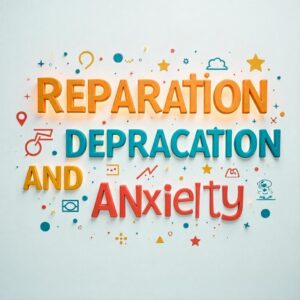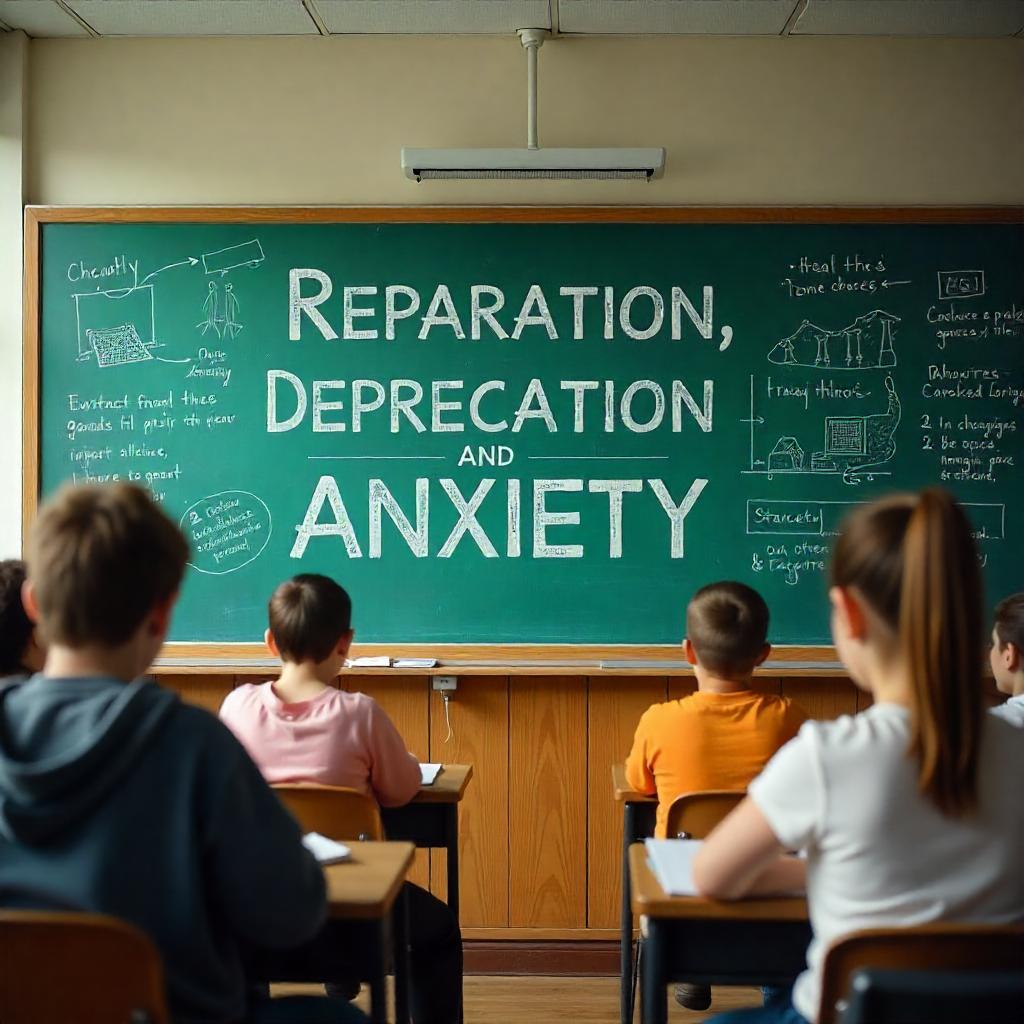Introduction
In our complex emotional landscape, words like reparation, deprecation, and anxiety often surface in discussions about mental health, social justice, and personal relationships. While these terms may seem interconnected, they represent distinct concepts that shape our understanding of human behavior and social dynamics. This comprehensive guide aims to unpack these terms, delve into their nuances, and explore how they impact our lives. Through this exploration, we will clarify the difference between reparation, deprecation, and anxiety, providing insights and practical applications for better mental and emotional well-being.

Understanding the Key Concepts
1. Reparation
Reparation is a multifaceted term that encompasses the act of making amends for wrongs or injuries. It can manifest in various forms, depending on the context:
Legal Context
In the legal realm, reparation refers to compensatory measures taken to rectify harm caused by wrongful actions. This can include:
- Monetary Compensation: When an individual or entity causes harm, they may be required to pay for damages. For instance, a company that pollutes a community may be obligated to compensate affected residents.
- Restitution: This involves returning property or funds to victims. For example, stolen art pieces may be returned to their rightful owners as a form of reparation.
Psychological Context
In psychology, reparation is often about healing emotional wounds caused by interpersonal relationships. Key aspects include:
- Acknowledgment of Wrongdoing: Individuals must recognize their actions and their impact on others. This acknowledgment is the first step toward healing.
- Restorative Actions: Taking steps to mend relationships, such as offering apologies or making amends, is crucial in the reparation process.
Social Context
Reparations can also have broader social implications, particularly in addressing historical injustices. This may include:
- Financial Reparations: Governments or organizations may provide compensation to marginalized communities affected by systemic injustices, such as slavery or colonization.
- Public Acknowledgment: Recognizing past wrongs through education, memorials, or public statements is essential for societal healing.
2. Deprecation
Deprecation is a term that conveys disapproval or a reduction in value. It appears in multiple contexts, each with its significance:
Technical Context
In the field of technology and software development, deprecation refers to:
- Obsolete Features: Features or functions that are no longer recommended for use because they may be replaced by better alternatives. For example, a programming language may deprecate certain functions in favor of more efficient ones.
Personal Context
On a personal level, deprecation often manifests as self-criticism or belittling oneself. This can take various forms:
- Self-Deprecating Humor: While often seen as a coping mechanism, consistently using self-deprecating humor can indicate underlying insecurities and may hinder self-esteem.
- Negative Self-Talk: Individuals may engage in negative self-talk, questioning their worth or abilities. This can lead to a cycle of self-doubt and decreased motivation.
Economic Context
In economics, deprecation refers to the reduction in value of an asset over time, often due to:
- Wear and Tear: Physical assets, like vehicles or machinery, lose value as they age and are used.
- Obsolescence: Technological advancements can make certain products outdated, leading to a decrease in their market value.

3. Anxiety
Anxiety is a psychological state characterized by feelings of worry, fear, or apprehension. It is a common human experience but can become problematic when it interferes with daily life. Key points about anxiety include:
Types of Anxiety
Anxiety manifests in various forms, including:
- Generalized Anxiety Disorder (GAD): Characterized by excessive, uncontrollable worry about various aspects of life.
- Panic Disorder: Involves recurrent panic attacks, which are sudden episodes of intense fear accompanied by physical symptoms.
- Social Anxiety Disorder: Involves intense fear or anxiety in social situations, leading to avoidance behavior.
- Specific Phobias: Irrational fears of specific objects or situations, such as heights or spiders.
Symptoms
Common symptoms of anxiety can include:
- Physical Symptoms: Increased heart rate, sweating, trembling, and fatigue.
- Cognitive Symptoms: Difficulty concentrating, racing thoughts, and excessive worry.
- Emotional Symptoms: Feelings of dread, irritability, and restlessness.
Management
Managing anxiety involves various approaches:
- Therapy: Cognitive-behavioral therapy (CBT) is effective in treating anxiety by helping individuals identify and change negative thought patterns.
- Medication: Antidepressants and anti-anxiety medications can help alleviate symptoms.
- Lifestyle Changes: Regular exercise, a balanced diet, and mindfulness practices can significantly reduce anxiety levels.
Key Differences Between Reparation, Deprecation, and Anxiety
Now that we have a foundational understanding of these concepts, let’s explore the differences between reparation, deprecation, and anxiety in more detail.
1. Nature of the Concepts
- Reparation is inherently positive, focusing on healing and restoration. It aims to rectify wrongs and improve relationships, whether on a personal or societal level.
- Deprecation, in contrast, often carries a negative connotation. It involves disapproval and can lead to feelings of inadequacy, whether directed towards oneself or others.
- Anxiety is a complex emotional state that can be both a normal reaction and a debilitating condition. It centers on fear and worry rather than the act of making amends or diminishing value.
2. Contextual Application
- Reparation is primarily used in legal, social, and psychological contexts, emphasizing the importance of accountability and healing.
- Deprecation is commonly found in technical, personal, and economic contexts, highlighting the need for caution regarding outdated practices or negative self-perceptions.
- Anxiety is most relevant in psychological discussions, focusing on mental health and emotional well-being.
3. Impact on Individuals
- Reparation can lead to positive outcomes, such as improved relationships and emotional healing. When individuals or societies take steps to make amends, it fosters a sense of closure and can promote forgiveness.
- Deprecation can result in negative self-esteem and hinder personal growth. It can also affect interpersonal relationships if one consistently belittles themselves or others, leading to a toxic environment.
- Anxiety can significantly impact daily functioning, relationships, and overall quality of life if left unaddressed. Chronic anxiety can lead to various physical and mental health issues, including depression and substance abuse.

In-Depth Exploration of Each Concept
Reparation: A Path to Healing
The Importance of Acknowledgment
One of the critical steps in the reparation process is acknowledging the harm caused. This acknowledgment allows for healing to begin, as it validates the experiences of those who have been wronged. For instance, in cases of historical injustices, public acknowledgment of past wrongs can foster healing and reconciliation within communities.
Steps to Achieve Reparation
- Recognition: Acknowledge the wrongs committed and the impact they have had on individuals or communities.
- Apology: Offering a sincere apology can be a powerful step toward healing. It shows accountability and a willingness to make amends.
- Compensation: Providing financial or material compensation can help address the harm caused. This may involve restitution for losses or funding for community programs that support healing.
- Restorative Practices: Engaging in restorative justice practices can facilitate dialogue between victims and offenders, promoting understanding and healing.
- Ongoing Support: Providing ongoing support, whether through counseling, education, or community resources, is vital for sustained healing.
Deprecation: Navigating Self-Perception
The Dangers of Self-Deprecation
While self-deprecating humor can be lighthearted, it can also mask deeper insecurities. Individuals who engage in self-deprecation may struggle with self-worth and confidence. This habit can create a negative feedback loop, where negative self-talk reinforces feelings of inadequacy.
Strategies to Combat Self-Deprecation
- Self-Compassion: Practice self-compassion by treating yourself with the same kindness you would offer to a friend. Recognize that everyone makes mistakes and has flaws.
- Challenge Negative Thoughts: Work to identify and challenge negative thoughts. Ask yourself whether these thoughts are based on facts or unfounded beliefs.
- Positive Affirmations: Incorporate positive affirmations into your daily routine to counteract negative self-talk. Remind yourself of your strengths and accomplishments.
- Seek Support: Talk to friends, family, or a mental health professional about your feelings. Sharing your experiences can help you gain perspective and support.
Anxiety: Understanding and Managing Fear
The Role of Anxiety in Life
Anxiety is a natural response to stress and can be beneficial in certain situations. It can motivate individuals to prepare for challenges and stay alert to potential dangers. However, when anxiety becomes chronic, it can hinder daily functioning and lead to mental health issues.
Effective Anxiety Management Techniques
- Mindfulness and Relaxation: Practices such as mindfulness meditation, deep breathing exercises, and progressive muscle relaxation can help reduce anxiety levels.
- Physical Activity: Regular exercise is a powerful tool for managing anxiety. It releases endorphins, which can improve mood and reduce stress.
- Establishing Routines: Creating a daily routine can provide structure and predictability, which can help alleviate anxiety.
- Professional Help: Seeking therapy or counseling can provide valuable support and coping strategies for managing anxiety.

FAQs
Q1: What is an example of reparation in a legal context?
A1: An example of reparation in a legal context would be a court awarding financial compensation to a victim of a car accident caused by another driver’s negligence.
Q2: How can I overcome self-deprecating thoughts?
A2: To overcome self-deprecating thoughts, practice self-compassion, challenge negative beliefs about yourself, and seek support from friends, family, or a mental health professional.
Q3: What are some common treatments for anxiety?
A3: Common treatments for anxiety include cognitive-behavioral therapy (CBT), medication (such as antidepressants or anti-anxiety drugs), mindfulness practices, and lifestyle changes like exercise and proper nutrition.
Q4: Can reparation be applied to historical injustices?
A4: Yes, reparation can be applied to historical injustices through initiatives that seek to address the wrongs of the past, such as financial compensation or public acknowledgment of harm caused.
Q5: Is anxiety always a problem?
A5: No, anxiety is a natural response to stress and can be beneficial in certain situations. However, when it becomes chronic and interferes with daily life, it may require professional intervention.
Q6: How does deprecation affect personal relationships?
A6: Deprecation can negatively impact personal relationships by fostering an environment of insecurity and negativity. When individuals constantly belittle themselves or others, it can lead to conflict and diminished trust.
Conclusion
In conclusion, understanding the difference between reparation, deprecation, and anxiety is essential for navigating our emotional and social landscapes. Each concept plays a distinct role in our lives, influencing how we relate to ourselves and others. By recognizing these differences, we can better address our mental health, foster healing, and promote positive relationships.
For more information on related topics, visit Info Vistaa and explore our extensive resources on mental health, legal issues, and online earning opportunities.
References
- American Psychological Association. (2020). Anxiety Disorders.
- National Institute of Mental Health. (2021). Understanding Anxiety Disorders.
- Legal Information Institute. (n.d.). Reparation.
- Merriam-Webster Dictionary. (n.d.). Definition of Deprecation.
- Gilbert, P. (2010). The Compassionate Mind: A Psychological Approach to Overcoming Your Difficulties. Constable & Robinson.


1 thought on “Difference Between Reparation, Deprecation, and Anxiety: A Comprehensive Guide”